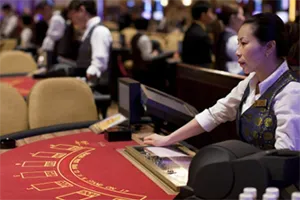 A recently published study, conducted by the Macao Polytechnic University, has thrown light on the challenges experienced by casino staff in tackling problem gambling behavior. The Perceptions and Practical Dilemmas of Responsible Gambling Faced by Frontline Casino Employees in Macao, relied on semi-structured interviews with 49 frontline casino workers from six gambling companies based in Macao.
A recently published study, conducted by the Macao Polytechnic University, has thrown light on the challenges experienced by casino staff in tackling problem gambling behavior. The Perceptions and Practical Dilemmas of Responsible Gambling Faced by Frontline Casino Employees in Macao, relied on semi-structured interviews with 49 frontline casino workers from six gambling companies based in Macao.
The academic research revealed the way these employees identify and tackle problem gambling behavior, as well as the intervention obstacles they face in the process. Following a close examination of the data, the researchers uncovered that the majority of interviewed casino employees were well aware of responsible gambling practices, but “a few employees have significant cognitive biases”. While they were able to discern the signs of compulsive gambling, they failed to intervene when necessary, the study said.
There were several main reasons preventing employees from properly tackling such behavior in players, with the main ones being fear of offending customers and avoiding conflicts. Furthermore, lack of support, guidelines, or knowledge were among the other underlying factors.
Setbacks in Macao’s RG Policy Can Adversely Affect the Market
 The study further suggested that many casino employees wrongly assumed that the accepted responsible gambling practices apply to local gamblers only. Foreign visitors are left out of the safer gambling messaging, thus bringing additional confusion on the matter of how to address problem gambling traits exhibited by them.
The study further suggested that many casino employees wrongly assumed that the accepted responsible gambling practices apply to local gamblers only. Foreign visitors are left out of the safer gambling messaging, thus bringing additional confusion on the matter of how to address problem gambling traits exhibited by them.
Foreign gamblers are exposed to occasional safer gambling signs and leaflets in casinos. The study concluded that “the main group of problem gamblers — Mainland gamblers — may not have received relevant information effectively, which may also have caused a bias in casino employees’ understanding of responsible gambling to a certain extent.”
Such setbacks in Macao’s responsible gambling policy could have an adverse effect on the local market’s reputation and sustainability, according to the study.
Therefore, the center suggested that Macao follow the example set by other jurisdictions, such as Australia and New Zealand, and their responsible gambling policies. The said countries have strict legislation in place requiring casino staff to undergo thorough training to identify and address problem gambling behavior.
The study concluded that while casino staff was adequately informed about the responsible gaming policy of Macao, there were particular challenges in putting this knowledge into practice. To improve the practical application of responsible gambling, the study recommended several measures.
There should be clear guidelines and responsibilities for casino operators and casino staff, formulating standards and intervention strategies to follow when problem gambling behavior is being identified. Furthermore, the scope of intervention should be elucidated, so that there is no hesitation on behalf of casino workers. Last but not least, improving staff training and education for foreign gamblers were among the other suggestions of the study’s authors.